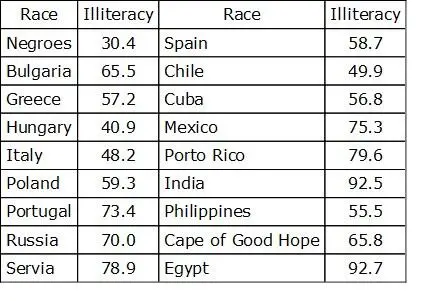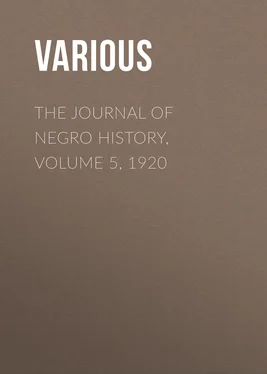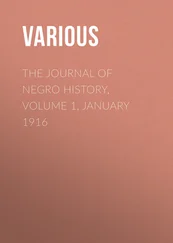Various - The Journal of Negro History, Volume 5, 1920
Здесь есть возможность читать онлайн «Various - The Journal of Negro History, Volume 5, 1920» — ознакомительный отрывок электронной книги совершенно бесплатно, а после прочтения отрывка купить полную версию. В некоторых случаях можно слушать аудио, скачать через торрент в формате fb2 и присутствует краткое содержание. Жанр: foreign_antique, periodic, История, foreign_edu, на английском языке. Описание произведения, (предисловие) а так же отзывы посетителей доступны на портале библиотеки ЛибКат.
- Название:The Journal of Negro History, Volume 5, 1920
- Автор:
- Жанр:
- Год:неизвестен
- ISBN:нет данных
- Рейтинг книги:4 / 5. Голосов: 1
-
Избранное:Добавить в избранное
- Отзывы:
-
Ваша оценка:
- 80
- 1
- 2
- 3
- 4
- 5
The Journal of Negro History, Volume 5, 1920: краткое содержание, описание и аннотация
Предлагаем к чтению аннотацию, описание, краткое содержание или предисловие (зависит от того, что написал сам автор книги «The Journal of Negro History, Volume 5, 1920»). Если вы не нашли необходимую информацию о книге — напишите в комментариях, мы постараемся отыскать её.
The Journal of Negro History, Volume 5, 1920 — читать онлайн ознакомительный отрывок
Ниже представлен текст книги, разбитый по страницам. Система сохранения места последней прочитанной страницы, позволяет с удобством читать онлайн бесплатно книгу «The Journal of Negro History, Volume 5, 1920», без необходимости каждый раз заново искать на чём Вы остановились. Поставьте закладку, и сможете в любой момент перейти на страницу, на которой закончили чтение.
Интервал:
Закладка:
The attitude of the Negro immediately after the war was that of opposition to all kinds of labor. He had not as then learned the distinction between working as a slave and working as a freedman. What he wanted most was an education, a literary education, such as the white man had. He did not want his education for any definite purpose, except as an end in itself. The chief reason probably may have been that of a desire to put himself on a par with the white man, and to prove his intellectual equality. The attitude to-day is radically different, being represented by men like Washington and DuBois. Washington preached the gospel of industrial education, believing strongly that that method would lead to an increase of the economic wealth of the race, whereby they could acquire the so-called higher education. DuBois, however, although he believed in the efficiency of industrial training, also felt that the race should not neglect to educate leaders even at the present time, so that his attitude differs from that of Washington in a slight degree. Two short quotations from Washington's writings may illustrate to a certain extent the attitude of the leaders of Negro education: "What Negro education needed most," said he, "was not so much more schools or different kinds of schools, as an educational policy and a school system, 60and "I want to see education as common as grass, and as free for all as sunshine and rain. 61
Prejudice is an important factor in the attitude of the white race toward Negro education. This prejudice seems to be in all sections of the country, but it is the southerner who is heard from the most, possibly because he is more in contact with the real problem and then because it seems to be a policy of southern politicians to attempt to outdo each other in their speeches along the line of race prejudice. According to Weatherford prejudice has arisen out of the fear that education will lead to the dominance of the Negro in politics and to promiscuous mingling in social life. "The southern white man will never be enthusiastic for Negro education, until he is convinced that such education will not lead to either of these." 62This feeling of a group is expressed in the following statement in a report to the Baltimore Council by a committee in 1913: "No fault is found with the Negroes' ambitions," said the report, "but the Committee feels that Baltimoreans will be criminally negligent as to their future happiness, if they suffer the Negroes' ambitions to go unchecked." 63Mr. Thomas Dixon, Junior, deplores the fact that Washington was training the Negroes to be "masters of men," stating that "if there is one thing the southern white man cannot endure it is an educated Negro." 64
School officials and educators on the other hand show an entirely different attitude. Mr. Glenn, recently Superintendent of Education of Georgia, made the declaration that "The Negro is … teachable and susceptible to the same kind of mental improvement characteristic to any other race." 65Thomas Nelson Page states that "the Negro may individually attain a fair and in uncommon instances a considerable degree of mental development." 66Another states that "We must educate him because ignorant men are dangerous, especially to a democracy pledged to educate all men." 67Some believe that we must also educate him for self-protection from vice and disease. The Southern Educational Association in 1907 passed the following resolution: "We endorse the accepted policy of the States of the South in providing educational facilities for the youth of the Negro race, believing that whatever the ultimate solution of this grievous problem may be, education must be an important factor in that solution." 68
Illiteracy which in 1863 equaled about 95 per cent of the Negro population has been decreasing rapidly since the Civil War. The illiteracy of the Negro during the last three decades has been as follows: in 1890, 57.1 per cent; in 1900, 44.5 per cent; and in 1910, 30.4 per cent. In the North in 1910 the illiteracy was 18.2 per cent in the South 48.0 per cent, and in the West 13.1 per cent. 69The urban Negro in 1910 showed 17.6 per cent illiteracy and the rural 36.5 per cent. Louisiana showed 48 per cent, whereas Minnesota and Oregon showed only 3.4 per cent. 70In 1900 when the Negro illiteracy was 44.5 per cent, the children between ten and twenty-five years of age showed only 30 per cent and those between 10 and 14 years in Mississippi showed only 22 per cent. 71The illiteracy for all Negro children was 25 per cent, whereas the illiteracy for all white children was only 10.5 per cent. 72The illiteracy of our Negroes does not seem so great when a comparison is made with some foreign countries: 73

The percentage of Negro illiteracy in America is less than any one of these foreign races.
The criminality of the Negro seemingly has decreased as the illiteracy has decreased. Out of every 100 criminals only 39 could read and 61 could not, whereas in the general population 43 could read and 57 could not. 74In the Mississippi penitentiary where they had 450 convicts of Negro blood one half of them could neither read nor write, and less than 10 per cent had anything like a fair education. 75Atlanta University has graduated 800 Negro men and women, not one of whom has ever been convicted of crime. Fisk University has only one graduate who has ever been convicted. Greensboro Agricultural and Technical College has had 2,000 students since its establishment, and only five have ever been convicted of crime. Two of these had been expelled students, and none were among the three hundred graduates of the college. Negro students who have gone to high school show a remarkably low percentage of crime. Of the 200 graduates from the Winston-Salem High School (North Carolina) only one has a criminal record. Waters Normal Institute at Winton, North Carolina, has graduated more than 130 students and not one of these has ever been arrested or convicted of any crime. 76The records of the southern prisons show that at least 90 per cent of those in prison are without trades of any sort. 77According to Booker T. Washington, "Manual training is as good a prevention of criminality as vaccination is of smallpox." 78In 1903, in Gloucester County, Virginia, twenty-five years after education had been introduced, there were 30 arrests for misdemeanors, 16 white and 14 black; and in the next year there were 15 arrests for misdemeanors, 14 white and one black. 79The general opinion of the southerner may be judged by the answers to a questionnaire sent out to prominent southern men in each of the Southern States. To the question "Does crime grow less as education increases?" there were 102, answered "yes" and 19 answered "no." 80
One of the charges against the Negro has been his shiftlessness, both as far as his personal industriousness is concerned, and as far as the care of his home and things about him. Now, however, education has increased his standards and his wants, so that since he desires to have land, homes, churches, books, papers, and education for his children, he will labor regularly and efficiently to supply these. The graduates of Tuskegee Institute are kept in touch with by one of the school officials, who reported that not 10 per cent could be found in idleness and that only one was in a penitentiary. 81
Loretta FunkeTHE NEGRO MIGRATION TO CANADA AFTER THE PASSING OF THE FUGITIVE SLAVE ACT
When President Fillmore signed the Fugitive Slave Bill 82on September 18, 1850, he started a Negro migration that continued up to the opening of the Civil War, resulting in thousands of people of color crossing over into Canada and causing many thousands more to move from one State into another seeking safety from their pursuers. While the free Negro population of the North increased by nearly 30,000 in the decade after 1850, the gain was chiefly in three States, Ohio, Michigan and Illinois. Connecticut had fewer free people of color in 1860 than in 1850 and there were half a dozen other States that barely held their own during the period. The three States showing gains were those bordering on Canada where the runaway slave or the free man of color in danger could flee when threatened. It is estimated that from fifteen to twenty thousand Negroes entered Canada between 1850 and 1860, increasing the Negro population of the British provinces from about 40,000 to nearly 60,000. The greater part of the refugee population settled in the southwestern part of the present province of Ontario, chiefly in what now comprises the counties of Essex and Kent, bordering on the Detroit River and Lake St. Clair. This large migration of an alien race into a country more sparsely settled than any of the Northern States might have been expected to cause trouble, but records show that the Canadians received the refugees with kindness and gave them what help they could. 83At the close of the Civil War many of the Negroes in exile returned, thus relieving the situation in Canada.
Читать дальшеИнтервал:
Закладка:
Похожие книги на «The Journal of Negro History, Volume 5, 1920»
Представляем Вашему вниманию похожие книги на «The Journal of Negro History, Volume 5, 1920» списком для выбора. Мы отобрали схожую по названию и смыслу литературу в надежде предоставить читателям больше вариантов отыскать новые, интересные, ещё непрочитанные произведения.
Обсуждение, отзывы о книге «The Journal of Negro History, Volume 5, 1920» и просто собственные мнения читателей. Оставьте ваши комментарии, напишите, что Вы думаете о произведении, его смысле или главных героях. Укажите что конкретно понравилось, а что нет, и почему Вы так считаете.












